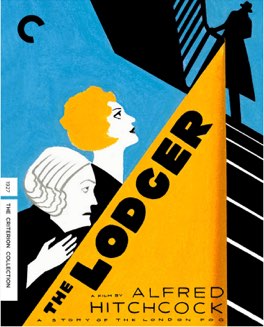ALFRED HITCHCOCK
The Lodger: A Story of the London Fog
This is far from a masterpiece, although it’s a perfectly pleasant and decent film. That’s hardly a crime, as so few movies can possible be “masterpieces". I suppose the only reason it’s notable at all is that it’s a Hitchcock film, and he does have an unusually high success rate. This one has a ton of the elements of what makes his later work great, but is firmly in the “future master learning his chops” phase of the experience.
That’s all well and good though, because what I mostly want to talk about is the way in which silent film forced filmmakers to be creative about how they conveyed meaning. The lack of one of the basic tools in a modern films toolkit, sound, necessitates that other methods of information passing be developed. This is hardly a big idea. But it struck me, watching this, that the truly successful silent films were the ones that used the least intertitle cards.
Famously Buster Keaton tried to have as few as possible. I think that was the right approach. By not relying on written words, which in the context of a movie are distracting at best, the filmmaker forces themselves to be deliberate about what matters and what doesn’t. So much of the conversation here is only relevant in very broad strokes. The exact details of who said what add very little to the overall comprehension of the story.
I’m going to argue that the addition of sound to cinema has been, in this one very narrow sense, a bit of a mixed bag. Long time readers here will probably know that I question why almost any film needs to be longer than roughly 90 minutes. If it was good enough for Bergman, it’s probably good enough for you. There are absolutely exceptions to that, but it’s good as a general guideline.
In that context, there are so many modern films that are overstuffed with irrelevant details, and in desperate need of an editor to cut them down. Something that was apparently also necessary here, supposedly the number of intertitles was “dramatically reduced” from the original cut to what was finally released. But so many directors these days seem drunk on the willingness of audiences to suffer through endlessly long scripts. We would all do very well to return to a more ruthless focus on presenting mostly just what’s necessary.
